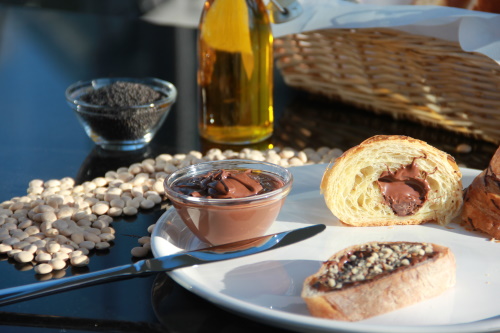Food products with up to 30% less fat – Fraunhofer IVV starts two new Europe-wide research projects
Many consumers want to eat healthy food products with less fat and without chemical additives. Indeed, even politicians are now recognizing this need and are paving the way for change. So-called light food products are available but are thought of dubiously because the reduction in fat is often offset by the use of additives and thickening agents. At the start of 2019 the Fraunhofer Institute for Process Engineering and Packaging IVV started two research projects to pursue new technological approaches for improving the nutri-physiological properties of processed food products. The goal of the food technologists at the Fraunhofer IVV and their project partners is to lower the amount of saturated fatty acids in foods by 30%. Controversial palm oil will be replaced by healthier and more sustainable oils such as rapeseed oil. Plant proteins will also be used to substitute fats. This will allow products with improved nutri-physiological properties to be developed such as cream fillings for pastries, spreads for bread, and savory products such as sauces.

To meet the growing demand for healthier foods, the Fraunhofer IVV is developing and optimizing methods for reformulating processed foods. This is enabling tasty products having less sugar, salt, and fat or enriched with dietary fiber and plant proteins to be manufactured. Altering the formulation of food products does, however, always impact the taste, shelf-life, and texture, with the latter being particularly decisive for how a product is perceived by consumers. "A particular focus of our development work is hence the texturing of foods", explains Christian Zacherl of the Fraunhofer IVV who is leading the two recently started projects. "Recipe changes and new product developments are being achieved by combining traditional manufacturing methods with innovative technologies and customized functional food ingredients, with plant proteins playing a decisive role here", stresses Zacherl.
Fat reduction using plant proteins
The use of plant proteins to replace fats in sauces and in cream fillings for pastries should reduce the fat content by 30%. Micellar proteins from lupines and other pulses can be used for this purpose. The spherical micellar proteins have structural properties similar to fats and also allow the protein content to be increased with reduction of the overall energy density. This objective will be reached using new ultra-high pressure technology that is being tested at our Spanish partner AZTI. This new process can be used during the manufacturing stage or on the final product for texture improvement or for lengthening the shelf-life. The Fraunhofer IVV will improve the functionality of the plant protein ingredients and adapt these to the process. Fat reduction is often accompanied by a limited product shelf-life. However, the new high-pressure process simultaneously brings microbiological stability. The process thus also enables a reduction in or no need for added preservatives.
Replacing palm oil with unsaturated fatty acids
Spreads for bread are often made with palm oil and hence contain a high proportion of saturated fatty acids. From a nutri-physiological point of view these are unhealthy fatty acids. They can increase blood fats and LDL cholesterol and adversely affect the cardiovascular system. This increases the risk of coronary heart disease. The Fraunhofer IVV is therefore developing ingredients based on high-quality, polyunsaturated oils that are able to completely replace palm oil. Oils from rapeseed and sunflowers are options for this. Before they can be used, however, properties such as their melting behavior and viscosity, which has a large effect on the mouth-feel, must be modified. The development team at the Fraunhofer IVV is working on targeted crystallization of the oils. The aim is to alter the texture of the oils such that, for example, they can be used as a spread for bread. Consequently, the amount of saturated, less healthy fat in products can be considerably reduced. The total fat content of these products is not being changed. They do, however, have a more favorable fatty acid make-up. The replacement of palm oil simultaneously improves the sustainability of the products because palm oil plantations are controversial from an environmental point of view.
Projects of the Knowledge and Innovation Community (KIC) on Food of the European Institute of Innovation and Technology (EIT)
The two new projects are being carried out within the framework of the Knowledge and Innovation Community (KIC) on Food of the EIT. This community focuses on the future of food products and the Fraunhofer-Gesellschaft is one of its members. This KIC was established in early 2017 and is a unique alliance of 50 leading companies, universities, and scientific partners developing new healthy and sustainable food products in Europe and beyond. The knowledge "triangle" of research, education, and entrepreneurship aims to promote a change in the overall food value-creation chain, taking into account the wishes of consumers.
Project partners
The research project underPRESSURE is realized with the project partners AZTI, Acesur, Puratos and Ypsicon. The research project OLEOGELS is implemented by Fraunhofer IVV together with Maspex, Acesur and the University of Warsaw.
Last modified:
 Fraunhofer Institute for Process Engineering and Packaging IVV
Fraunhofer Institute for Process Engineering and Packaging IVV